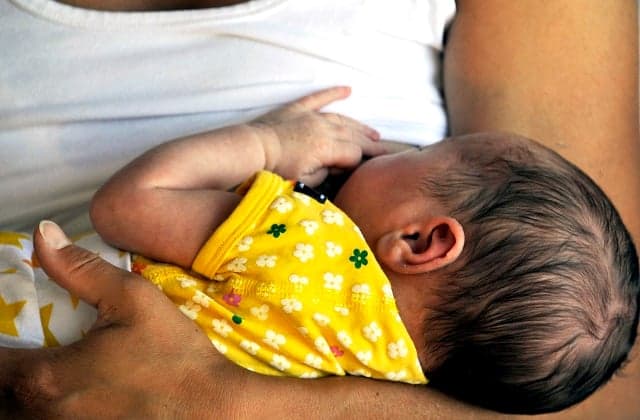Breastfeeding does not protect against hay fever or asthma, Swedish study suggests

Breastfeeding does not protect against asthma and allergies, and may increase the risk of developing hay fever and eczema, according to a recent study by Swedish researchers.
Researchers have long debated the effect of breastfeeding on the risk of developing asthma and allergies, with some studies reporting a lowered risk and some an increased risk among people who were breastfed as children. The study, published by researchers from Uppsala University, was the largest of its kind ever carried out, looking at self-reported data from over 330,000 people in the UK.
"When I started out, I wasn't sure what to expect. I read a lot of studies which were all conflicting," Weronica Ek, a researcher at the university’s Department of Immunology, Genetics and Pathology who led the study, told The Local.
"Our study showed that people who were breastfed as babies have a higher risk of developing hay fever and eczema, while there is no effect on asthma," she said.
The data also looked at the influence of lifestyle factors, and showed that a higher socioeconomic status leads to a lower risk of asthma but a higher risk of hay fever and allergies.
READ ALSO: 'Make it a law to protect breastfeeding in public'
These findings are in line with the so-called 'hygiene hypothesis'; the idea that children who grow up in cleaner environments have a higher risk of developing allergies due to lack of exposure to microorganisms.
Individuals with a high BMI also had a higher than average risk for asthma, hay fever, and eczema, and so this was one of several factors the researchers had to adjust for, as well as gender, when the individuals were born, and whether they grew up in the city or countryside.
"As is always the problem with observational studies, there may be other lifestyle factors we don't know or haven't corrected for, for example if the mother had the diseases, which may have a significant effect," Ek added.
Because of this, it is not possible to make clinical recommendations based on the study's findings, and Ek noted that breastfeeding has been proven to be beneficial for other aspects of babies' health, but she hopes the study will help to provide clearer information about breastfeeding.
READ ALSO: Baker makes Swedish Lucia buns using her own breast milk
Comments
See Also
Researchers have long debated the effect of breastfeeding on the risk of developing asthma and allergies, with some studies reporting a lowered risk and some an increased risk among people who were breastfed as children. The study, published by researchers from Uppsala University, was the largest of its kind ever carried out, looking at self-reported data from over 330,000 people in the UK.
"When I started out, I wasn't sure what to expect. I read a lot of studies which were all conflicting," Weronica Ek, a researcher at the university’s Department of Immunology, Genetics and Pathology who led the study, told The Local.
"Our study showed that people who were breastfed as babies have a higher risk of developing hay fever and eczema, while there is no effect on asthma," she said.
The data also looked at the influence of lifestyle factors, and showed that a higher socioeconomic status leads to a lower risk of asthma but a higher risk of hay fever and allergies.
READ ALSO: 'Make it a law to protect breastfeeding in public'
These findings are in line with the so-called 'hygiene hypothesis'; the idea that children who grow up in cleaner environments have a higher risk of developing allergies due to lack of exposure to microorganisms.
Individuals with a high BMI also had a higher than average risk for asthma, hay fever, and eczema, and so this was one of several factors the researchers had to adjust for, as well as gender, when the individuals were born, and whether they grew up in the city or countryside.
"As is always the problem with observational studies, there may be other lifestyle factors we don't know or haven't corrected for, for example if the mother had the diseases, which may have a significant effect," Ek added.
Because of this, it is not possible to make clinical recommendations based on the study's findings, and Ek noted that breastfeeding has been proven to be beneficial for other aspects of babies' health, but she hopes the study will help to provide clearer information about breastfeeding.
READ ALSO: Baker makes Swedish Lucia buns using her own breast milk
Join the conversation in our comments section below. Share your own views and experience and if you have a question or suggestion for our journalists then email us at [email protected].
Please keep comments civil, constructive and on topic – and make sure to read our terms of use before getting involved.
Please log in here to leave a comment.